人教版高一英语必修四 Unit1 Women of achievement language-points (1)课件(共39张PPT)
文档属性
| 名称 | 人教版高一英语必修四 Unit1 Women of achievement language-points (1)课件(共39张PPT) | 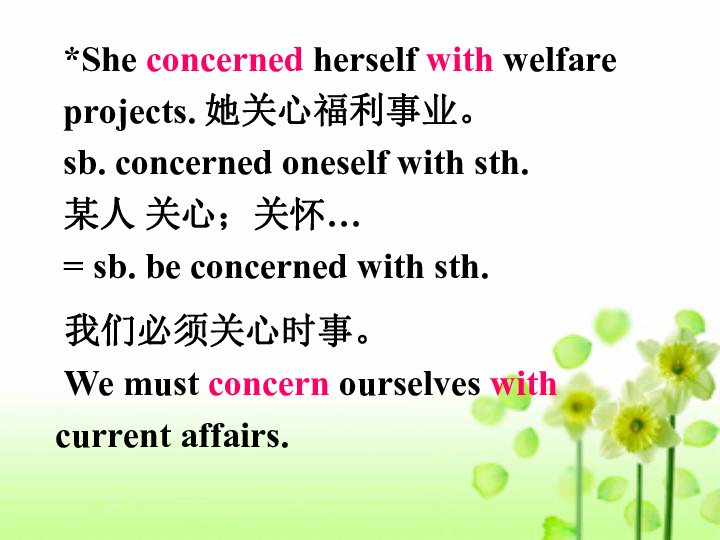 | |
| 格式 | zip | ||
| 文件大小 | 203.0KB | ||
| 资源类型 | 教案 | ||
| 版本资源 | 人教版(新课程标准) | ||
| 科目 | 英语 | ||
| 更新时间 | 2020-02-29 10:52:10 | ||
图片预览

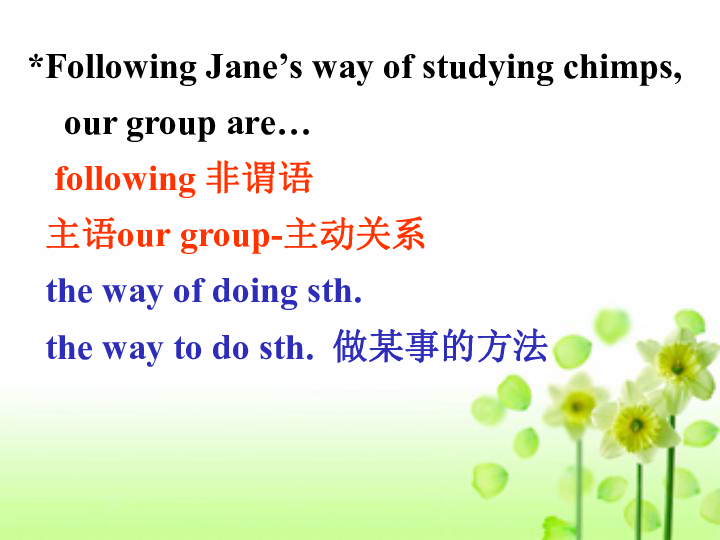
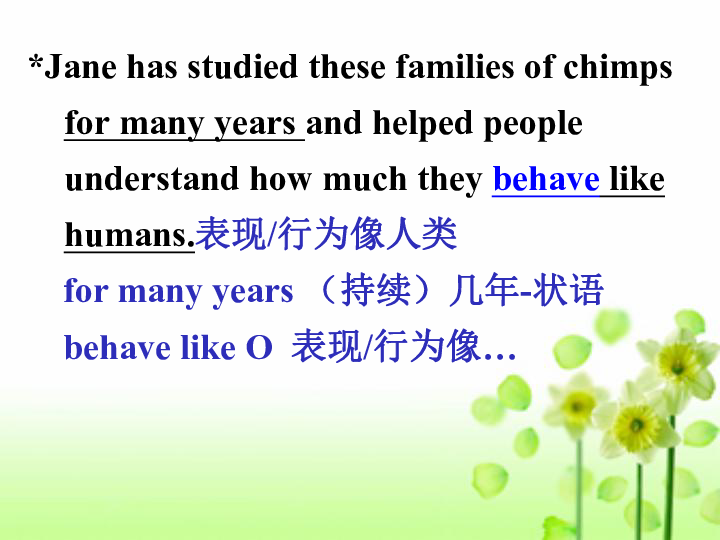
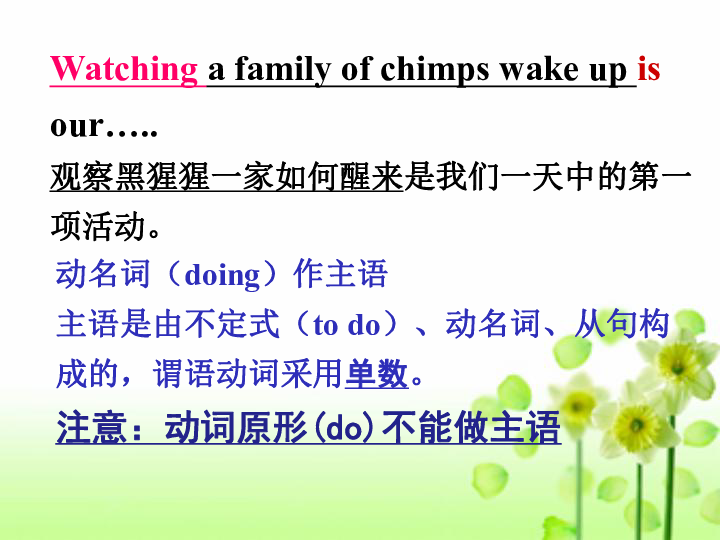
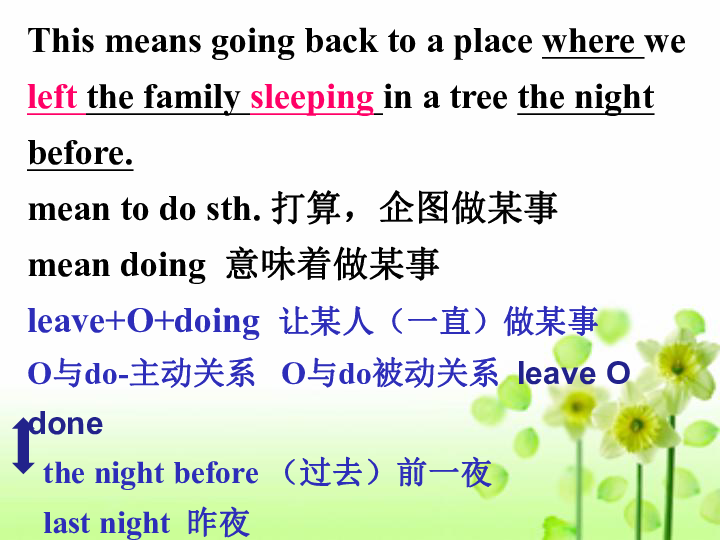
文档简介
(共39张PPT)
*She concerned herself with welfare projects. 她关心福利事业。
sb. concerned oneself with sth.
某人 关心;关怀…
= sb. be concerned with sth.
我们必须关心时事。
We must concern ourselves with current affairs.
*Following Jane’s way of studying chimps, our group are…
following 非谓语
主语our group-主动关系
the way of doing sth.
the way to do sth. 做某事的方法
*Jane has studied these families of chimps for many years and helped people understand how much they behave like humans.表现/行为像人类
for many years (持续)几年-状语
behave like O 表现/行为像…
Watching a family of chimps wake up is our…..
观察黑猩猩一家如何醒来是我们一天中的第一项活动。
动名词(doing)作主语
主语是由不定式(to do)、动名词、从句构成的,谓语动词采用单数。
注意:动词原形(do)不能做主语
This means going back to a place where we left the family sleeping in a tree the night before.
mean to do sth. 打算,企图做某事
mean doing 意味着做某事
leave+O+doing 让某人(一直)做某事
O与do-主动关系 O与do被动关系 leave O done
the night before (过去)前一夜
last night 昨夜
… the evening makes it all worthwhile.
worthwhile adj. 有意义的,值得的
It is worthwhile doing sth/ to do sth.
It is worthwhile to do the job. /doing the job.
a worthwhile experiment
The experiment is worthwhile.
well worth reading.
The book is _________________
= The book is worthy to be read.
= The book is worthy of being read.
=It is worthwhile to read/reading the book.
Compare:
sth. be worth doing
sth. be worthy of being done
sth. be worthy to be done…
It is worthwhile doing sth/ to do sth.
主语是it
主语是sth.
in the tree/ on the tree
in the tree 不属于树:如鸟等动物;
on the tree 属于树: 如果实, 花等。
strengthen the bond between A and B
加强A跟B的联系
She spent years observing and recording their daily activities.
spend sth (on sth)/ (in) doing sth
花了…做某事
他将全部积蓄花在一辆新车上。
He spent all his savings on a new car.
It is unusual for a woman to live in the forest.
一个女人居住森林里是不常见的。
句型:It is unusual for sb. to do sth.
某人做某事是不常见的
Only after her mother came to help her for the first few months was she allowed to begin her project. 在她母亲头几个月来帮忙后,她才得以开始自己的计划。
Only 部分倒装的2个条件
1.only 放句首
2.Only +状语 状语=adv./prep.+n./状语从句
倒装三部曲
主语
情态动词
助动词
be
do
do/done
adj./done/doing
He worked.
He can work.
He was able to work.
He is working.
He has worked.
did he work
can he work.
was he able to work
is he working
has he worked
◎谓语动词只有1词(动词) 加入适当的助动词
changed the way (省略/in which/that )
people think about chimps
改变了人们对猩猩的看法
…her study of their body language helped her work out their social system.
work out the meaning of the poem.
(理解,说出)
work out his income
work out a plan.
(算出)
(制定,拟订)
argue with sb. over/ about sth.
与某人争辩某事
argue that+完句 争辩说道。。。
argue for / against为……而辩护/为反对……而辩论
Once I stop, it all comes crowding in and I remember the chimps in laboratories.
我一旦停下来,所有的一切都会涌上心头,我就会想起实验室里的黑猩猩。
从句once引导的时间状语从句。
主句crowding in是非谓语
Once water begins to boil, its temperature no longer rises.
水一开始沸腾,温度就不再升高。
Once it is seen, it can never be forgotten.
见一次就永远不会忘记。
Physics is easy to learn once you understand the rules.
一旦你理解了规则,物理就不难学了。
[仿写]
一旦你开始读, 你就会喜欢它。
2. 一旦你开始了,就不要放弃。
3. 一旦染上坏习惯,想改掉就难了。
Once you get into a bad habit, it is hard to get out of it.
Once you begin to read it, you will like it.
Once you start, never give it up.
13. inspire sb. to do 鼓励某人做某事
His speech inspired us greatly.
The teacher inspired us to make greater efforts.
The memory of his childhood inspired his first novel.
inspire 促成;赋予灵感
inspired 有灵感的
inspiring 激励人心的
1. The agreement strengthened the _______ (联系) between the two countries.
2. A bird lays eggs in the ___ (巢) it has built.
I. 根据下列各句句意及所给单词的首字母或汉语提示, 写出该单词的正确形式。
bond (s)
nest
练习坊
3. Their _________ (举止) towards me shows that they do not like me.
4. She had a happy _________ (童年).
5. Television provides knowledge as well as ____________ (娱乐).
behaviour
childhood
entertainment
6. She is so _________ (直言的) that she has hurt the feelings of all her friends.
7. There are no trees or bushes to give s_____ in this area, so it is very hot here.
outspoken
shade
1. He finds it hard to train children to ______ (behave) well at the table.
2. It didn’t seem __________ (worthwhile) writing it all out again.
3. The police have been _________ (observe) his movements these days.
II. 用所给单词的适当形式填空。
behave
worthwhile
observing
4. As a teacher, he is ________ (respect) for his good teaching.
5. What are you two _______ (argue) about?
6. This school is _________ (support) by the government.
7. We remembered the ________ (inspire) talks he gave us last time.
respected
arguing
supported
inspiring
III. 用适当的介词或副词填空。
1. The water will rise ____ the bridge; look out while crossing it!
2. He didn’t wake __ until 11 o’clock in the morning.
3. We used to sit __ the shade of the tree to avoid the summer heat.
4. Surely Robbie must have returned __ now.
over
up
in
by
5. At last they arrived __ London safe and sound.
6. Parents often find it difficult to communicate ____ their children.
7. I believe that you can work ___ this problem by yourself. Believe in yourself!
in
with
out
8. Do you know when the United Nations was set __?
9. It’s hard for the young bird to survive __ the wild.
up
in
IV. 根据汉语提示完成下列句子。
1. Nobody else walked out, and the train _________ (开走了) shortly afterwards. He alone stood on the platform.
2. They __________ (挤进去) to see the performance.
moved off
crowded in
3. Only by knowing yourself ____________ (你才能希望) to become an effective leader.
4. No matter what you do, _____________ (一旦开始), you must continue.
once you begin
can you hope
behaved badly
learn to behave
(1) vi. to act; bear oneself 行为, 举止, 举止适当或有礼
她表现出了很大的勇气.
She behaved with great courage.
他对顾客的态度不好.
He ____________ to (towards) the customers.
你应该学会举止得体
You should ______________.
(2) vt. (oneself) in a socially accepted or polite way 举止适当或有礼
Please behave (yourselves), children.
(3) vi. (of things) to act in a particular way (指事物) 有某种作用
我的摄像机自从修好后一直很正常。My camera ____________________ since it was repaired.
Working?with?you?is?pleasant.
Seeing is believing.
eg: They went off and left me sitting
there all by myself.
has been behaving well
1) spend
你暑假怎么打发? How will __________________________?
you spend your summer holiday
他把钱都花光了。
He has spent all his money.
spend sth (on sth)/ (in) doing sth用(钱);花(钱)
他将全部积蓄花在一辆新车上。
He spent all his savings on a new car.
这位科学家一生都在观察星星。
The scientist has observed the stars all his life.
I observed a stranger go/going into the office.
They ___ the train until it disappeared in the distance.
A. saw B. watched C. noticed D. observed
B
1. 只有当你明白我的意思了, 你才能认识到你的错误.
2. 只有当战争结束之后,他才重新回来工作.
3. 只有用这种方法,我们才能按时完成任务.
Only when you understand what I mean, can you realize your mistake.
Only after the war was over did he come back to work.
Only in this way can we finish the task in time.
spend
pay
cost
take
花费
sb. spend … on sth.
in (doing) sth.
sb. pay some money for sth
sth. cost sb. some money
It takes sb. … to do sth
He _____ about a third of his salary in
drinking.
She ____ 3000 dollars for the dress.
The DVD ____ her 150 yuan.
It ____ him ten days to finished the work.
spent
paid
cost
took
only+状语“+部分倒装
只有这样,我们才能学好英语。
Only in this way_______________________.
到那时我才意识到我的错误。
Only then_______________________.
did I realize my mistakes
can we learn English better
但Only +主语时不倒装
只有你了解我。
Only you_______________
understand me.
argue (vi.) +with sb. about/over sth.
同某人辩论某事
他们正在和同学争论这个问题的解决方法.
They are arguing with their classmates
about the solution to the problem.
他们正在争执战争是否正当。
They are arguing with each other
about the justice of the war.
argue (vt.) + n. /clause(从句)/sb. to be…
我们据理力争我们应该得到更高的薪水。
We argued that we should be paid more.
他花钱的方式说明他很富有。
The way he spends money argues him to be rich.
argue for / against为……而辩护/为反对……而辩论
工人们为争取罢工的权力而辩论。
The workers argued for the right to strike.
那个有名的律师将为这个穷人辩护.
That famous lawyer will argue for the poor man.
一些人为反对自由贸易辩论。 Some people argue against free trade.
*She concerned herself with welfare projects. 她关心福利事业。
sb. concerned oneself with sth.
某人 关心;关怀…
= sb. be concerned with sth.
我们必须关心时事。
We must concern ourselves with current affairs.
*Following Jane’s way of studying chimps, our group are…
following 非谓语
主语our group-主动关系
the way of doing sth.
the way to do sth. 做某事的方法
*Jane has studied these families of chimps for many years and helped people understand how much they behave like humans.表现/行为像人类
for many years (持续)几年-状语
behave like O 表现/行为像…
Watching a family of chimps wake up is our…..
观察黑猩猩一家如何醒来是我们一天中的第一项活动。
动名词(doing)作主语
主语是由不定式(to do)、动名词、从句构成的,谓语动词采用单数。
注意:动词原形(do)不能做主语
This means going back to a place where we left the family sleeping in a tree the night before.
mean to do sth. 打算,企图做某事
mean doing 意味着做某事
leave+O+doing 让某人(一直)做某事
O与do-主动关系 O与do被动关系 leave O done
the night before (过去)前一夜
last night 昨夜
… the evening makes it all worthwhile.
worthwhile adj. 有意义的,值得的
It is worthwhile doing sth/ to do sth.
It is worthwhile to do the job. /doing the job.
a worthwhile experiment
The experiment is worthwhile.
well worth reading.
The book is _________________
= The book is worthy to be read.
= The book is worthy of being read.
=It is worthwhile to read/reading the book.
Compare:
sth. be worth doing
sth. be worthy of being done
sth. be worthy to be done…
It is worthwhile doing sth/ to do sth.
主语是it
主语是sth.
in the tree/ on the tree
in the tree 不属于树:如鸟等动物;
on the tree 属于树: 如果实, 花等。
strengthen the bond between A and B
加强A跟B的联系
She spent years observing and recording their daily activities.
spend sth (on sth)/ (in) doing sth
花了…做某事
他将全部积蓄花在一辆新车上。
He spent all his savings on a new car.
It is unusual for a woman to live in the forest.
一个女人居住森林里是不常见的。
句型:It is unusual for sb. to do sth.
某人做某事是不常见的
Only after her mother came to help her for the first few months was she allowed to begin her project. 在她母亲头几个月来帮忙后,她才得以开始自己的计划。
Only 部分倒装的2个条件
1.only 放句首
2.Only +状语 状语=adv./prep.+n./状语从句
倒装三部曲
主语
情态动词
助动词
be
do
do/done
adj./done/doing
He worked.
He can work.
He was able to work.
He is working.
He has worked.
did he work
can he work.
was he able to work
is he working
has he worked
◎谓语动词只有1词(动词) 加入适当的助动词
changed the way (省略/in which/that )
people think about chimps
改变了人们对猩猩的看法
…her study of their body language helped her work out their social system.
work out the meaning of the poem.
(理解,说出)
work out his income
work out a plan.
(算出)
(制定,拟订)
argue with sb. over/ about sth.
与某人争辩某事
argue that+完句 争辩说道。。。
argue for / against为……而辩护/为反对……而辩论
Once I stop, it all comes crowding in and I remember the chimps in laboratories.
我一旦停下来,所有的一切都会涌上心头,我就会想起实验室里的黑猩猩。
从句once引导的时间状语从句。
主句crowding in是非谓语
Once water begins to boil, its temperature no longer rises.
水一开始沸腾,温度就不再升高。
Once it is seen, it can never be forgotten.
见一次就永远不会忘记。
Physics is easy to learn once you understand the rules.
一旦你理解了规则,物理就不难学了。
[仿写]
一旦你开始读, 你就会喜欢它。
2. 一旦你开始了,就不要放弃。
3. 一旦染上坏习惯,想改掉就难了。
Once you get into a bad habit, it is hard to get out of it.
Once you begin to read it, you will like it.
Once you start, never give it up.
13. inspire sb. to do 鼓励某人做某事
His speech inspired us greatly.
The teacher inspired us to make greater efforts.
The memory of his childhood inspired his first novel.
inspire 促成;赋予灵感
inspired 有灵感的
inspiring 激励人心的
1. The agreement strengthened the _______ (联系) between the two countries.
2. A bird lays eggs in the ___ (巢) it has built.
I. 根据下列各句句意及所给单词的首字母或汉语提示, 写出该单词的正确形式。
bond (s)
nest
练习坊
3. Their _________ (举止) towards me shows that they do not like me.
4. She had a happy _________ (童年).
5. Television provides knowledge as well as ____________ (娱乐).
behaviour
childhood
entertainment
6. She is so _________ (直言的) that she has hurt the feelings of all her friends.
7. There are no trees or bushes to give s_____ in this area, so it is very hot here.
outspoken
shade
1. He finds it hard to train children to ______ (behave) well at the table.
2. It didn’t seem __________ (worthwhile) writing it all out again.
3. The police have been _________ (observe) his movements these days.
II. 用所给单词的适当形式填空。
behave
worthwhile
observing
4. As a teacher, he is ________ (respect) for his good teaching.
5. What are you two _______ (argue) about?
6. This school is _________ (support) by the government.
7. We remembered the ________ (inspire) talks he gave us last time.
respected
arguing
supported
inspiring
III. 用适当的介词或副词填空。
1. The water will rise ____ the bridge; look out while crossing it!
2. He didn’t wake __ until 11 o’clock in the morning.
3. We used to sit __ the shade of the tree to avoid the summer heat.
4. Surely Robbie must have returned __ now.
over
up
in
by
5. At last they arrived __ London safe and sound.
6. Parents often find it difficult to communicate ____ their children.
7. I believe that you can work ___ this problem by yourself. Believe in yourself!
in
with
out
8. Do you know when the United Nations was set __?
9. It’s hard for the young bird to survive __ the wild.
up
in
IV. 根据汉语提示完成下列句子。
1. Nobody else walked out, and the train _________ (开走了) shortly afterwards. He alone stood on the platform.
2. They __________ (挤进去) to see the performance.
moved off
crowded in
3. Only by knowing yourself ____________ (你才能希望) to become an effective leader.
4. No matter what you do, _____________ (一旦开始), you must continue.
once you begin
can you hope
behaved badly
learn to behave
(1) vi. to act; bear oneself 行为, 举止, 举止适当或有礼
她表现出了很大的勇气.
She behaved with great courage.
他对顾客的态度不好.
He ____________ to (towards) the customers.
你应该学会举止得体
You should ______________.
(2) vt. (oneself) in a socially accepted or polite way 举止适当或有礼
Please behave (yourselves), children.
(3) vi. (of things) to act in a particular way (指事物) 有某种作用
我的摄像机自从修好后一直很正常。My camera ____________________ since it was repaired.
Working?with?you?is?pleasant.
Seeing is believing.
eg: They went off and left me sitting
there all by myself.
has been behaving well
1) spend
你暑假怎么打发? How will __________________________?
you spend your summer holiday
他把钱都花光了。
He has spent all his money.
spend sth (on sth)/ (in) doing sth用(钱);花(钱)
他将全部积蓄花在一辆新车上。
He spent all his savings on a new car.
这位科学家一生都在观察星星。
The scientist has observed the stars all his life.
I observed a stranger go/going into the office.
They ___ the train until it disappeared in the distance.
A. saw B. watched C. noticed D. observed
B
1. 只有当你明白我的意思了, 你才能认识到你的错误.
2. 只有当战争结束之后,他才重新回来工作.
3. 只有用这种方法,我们才能按时完成任务.
Only when you understand what I mean, can you realize your mistake.
Only after the war was over did he come back to work.
Only in this way can we finish the task in time.
spend
pay
cost
take
花费
sb. spend … on sth.
in (doing) sth.
sb. pay some money for sth
sth. cost sb. some money
It takes sb. … to do sth
He _____ about a third of his salary in
drinking.
She ____ 3000 dollars for the dress.
The DVD ____ her 150 yuan.
It ____ him ten days to finished the work.
spent
paid
cost
took
only+状语“+部分倒装
只有这样,我们才能学好英语。
Only in this way_______________________.
到那时我才意识到我的错误。
Only then_______________________.
did I realize my mistakes
can we learn English better
但Only +主语时不倒装
只有你了解我。
Only you_______________
understand me.
argue (vi.) +with sb. about/over sth.
同某人辩论某事
他们正在和同学争论这个问题的解决方法.
They are arguing with their classmates
about the solution to the problem.
他们正在争执战争是否正当。
They are arguing with each other
about the justice of the war.
argue (vt.) + n. /clause(从句)/sb. to be…
我们据理力争我们应该得到更高的薪水。
We argued that we should be paid more.
他花钱的方式说明他很富有。
The way he spends money argues him to be rich.
argue for / against为……而辩护/为反对……而辩论
工人们为争取罢工的权力而辩论。
The workers argued for the right to strike.
那个有名的律师将为这个穷人辩护.
That famous lawyer will argue for the poor man.
一些人为反对自由贸易辩论。 Some people argue against free trade.
同课章节目录
